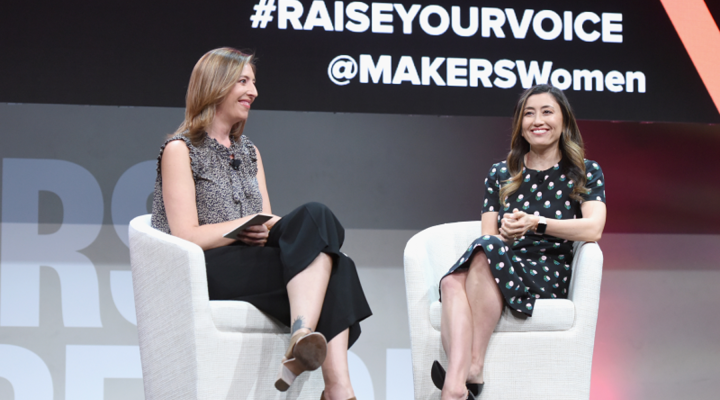
Stitch Fix’s CEO says there should be more seats at the table, not in investors’ hot tubs
Stitch Fix’s CEO says there should be more seats at the table, not in investors’ hot tubs

Tech, like a lot of other industries, is dominated by men. Women get $3 in venture capital for every $4 that men do, according to tech site Crunchbase. And only 17 percent of startups had a woman as their founder in 2017. Katrina Lake, the founder and CEO of Stitch Fix, has experienced that sexism first hand. In 2017 she was the only female CEO to take a tech company public in the U.S. Marketplace Tech host Molly Wood spoke with Lake at the Makers Conference in Los Angeles about navigating Silicon Valley’s sexist culture. The following is an edited transcript of their conversation.
Molly Wood: You know, when you look back on that journey and those meetings with venture capitalists, the number of “noes” are we talking it could fill a bathtub or like an Olympic sized swimming pool?
Katrina Lake: Actually, I mean, I can tell you how many people said “yes” and it’s the three people that were investors in Stitch Fix. And I have a Google spreadsheet of all the “noes” and all of the “whys.” And yeah, it’s probably more in the swimming pool range than a bathtub, you know, 50 plus.
Wood: Because not only were you a woman founder, you were also pitching a company for women. So double whammy, one assumes. But what were the “whys” that they would give you?
Lake: The “noes” were all kinds of “noes.” It was, “No, I just don’t believe that many women will shop this way.” There was a “no” where it was like I would come in and I would have a box that was a Fix and like a guy looked at it and was like, “I just don’t understand why anybody would ever want something like this.” I appreciate the honesty. I’m like, “OK, great, this doesn’t seem like a fit. We’ll move on and find somebody who is excited about this.” There are seed stage “noes,” which are really around like, “This is a good idea. Are you the right person to execute it? I don’t know.” The later-stage “noes” are the harder ones. And so, like the Series B “noes” of like, I have a business that is generating millions of dollars. People are waiting 60 or 90 days to get a Fix because, like, we don’t have the infrastructure to serve, like, the millions of people that this is an attractive proposition for. And I have an amazing team. I have the COO of Walmart.com who’s my COO, and the guy who ran all of the algorithms at Netflix runs all of algorithms at Stitch Fix. Clients love it and they’re waiting to get the service. And yet, people were like, “I just, like, I just can’t get excited about it.” And those were really hard because it was like I knew that I was pitching a female-oriented product to a very male-oriented audience and so I was the entrepreneur more than anybody that they’ve ever met that knew my numbers inside and out. And like you can make a lot of money doing this and it was hard.
Wood: Well and one of the things we’ve been talking about a lot, and that has really been a theme in this conference is using your power once you get it. And how do you become, not just a successful CEO, but someone who is influencing the people around you and sometimes saying things that they have never heard before. Tell us your “hot tub” story. I mean, this is just, you know, when you think about culture and how deep some of this stuff goes you’ve got sort of a perfect example of being the only woman in the room.
Lake: I couldn’t have been the only woman in the room, but I was at a conference that was actually kind of like this size. It wasn’t a huge conference. And there was a VC who was being interviewed, Chris Sacca was being interviewed up there. I’ve already outed his name. Chris Sacca is being interviewed and he was, like, “I have a very untraditional approach to the VC. Like, I don’t even live in the city. I don’t even have an office. I live up in Tahoe and I invite entrepreneurs up to my place in Tahoe and I have them tell me about their company over beers in the hot tub. And I can get to know them more as humans that way.” And I was sitting in the audience, like, literally pregnant. You’re asking people to come pitch to you in a swimsuit and, like, I’m literally pregnant and I actually can’t come into your hot tub and I actually can’t drink your beers. And I was in a room with hundreds of people and maybe they were all thinking the same thing. I don’t know if they were or they weren’t but it was stated out loud. It wasn’t tweeted, it wasn’t controversial. And this is, you know, two years ago.
| Why discrimination in venture capital runs deep |
| Calling for a new way to fund startups |
| Where does Silicon Valley’s bro culture start? VC |
There’s a lot happening in the world. Through it all, Marketplace is here for you.
You rely on Marketplace to break down the world’s events and tell you how it affects you in a fact-based, approachable way. We rely on your financial support to keep making that possible.
Your donation today powers the independent journalism that you rely on. For just $5/month, you can help sustain Marketplace so we can keep reporting on the things that matter to you.












